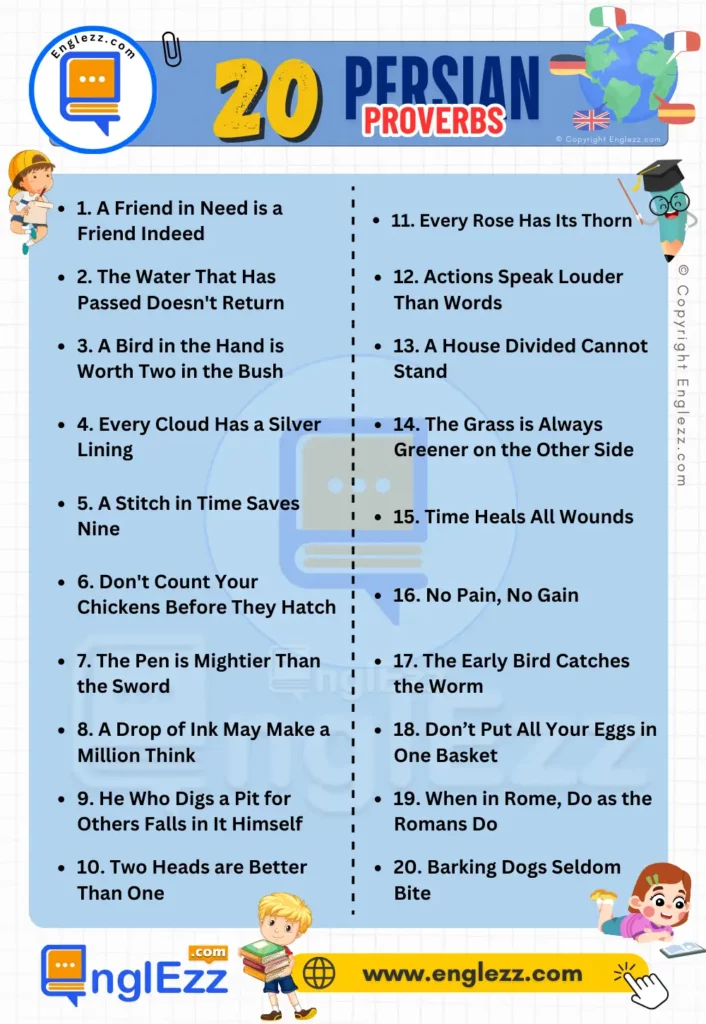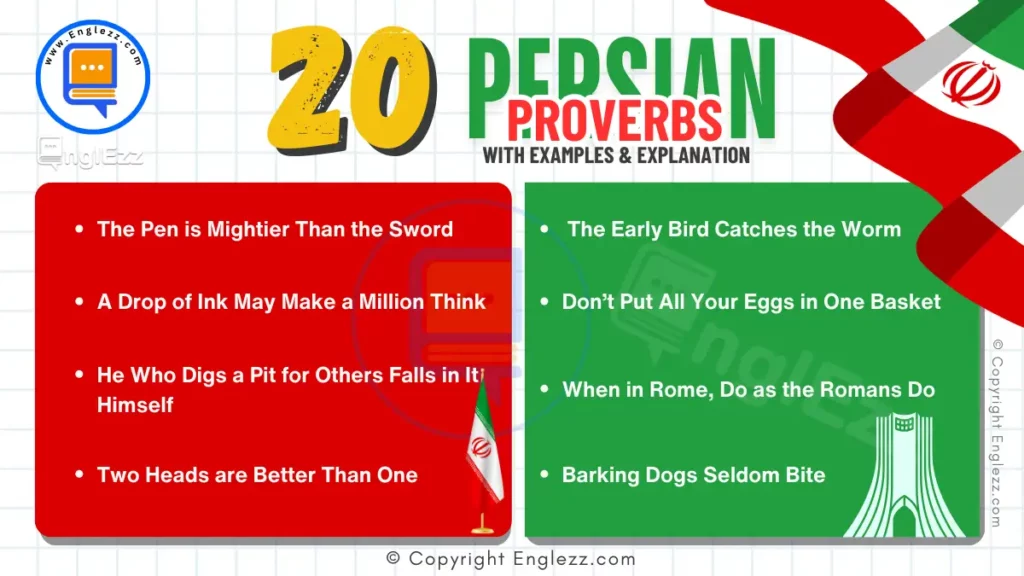Persian proverbs are a treasure trove of wisdom, reflecting centuries of rich cultural heritage and insightful observations about life. These proverbs offer valuable lessons, often expressed in poetic and metaphorical language that captures the essence of human experiences. In this blog post, we will explore 20 originally Persian proverbs in English, complete with explanations and practical examples.
Each proverb will be presented with its native Persian script, phonetic transcription, and two illustrative examples of how the translated version can be used in everyday conversations.
Top 20 Persian Proverbs Translated into English with Examples
Whether you’re a language learner, a culture enthusiast, or simply curious about the wisdom embedded in Persian sayings, this collection will offer you a glimpse into the values and nuances of Persian thought. Dive in to discover how these ancient expressions can still resonate in our modern lives, providing timeless advice and perspective.

#1. “He who has a mouth, let him also eat” 🍽️
- Original Persian Proverb: “آنکه دهان دارد، بخورد”
- Phonetic Transcription: “Ān-ke dahān dārad, bekhorad”
- Explanation: This proverb implies that if one is entitled to something, they should also take responsibility or accept the consequences. It emphasizes the connection between having rights and fulfilling duties.
- Example 1: If someone wants to enjoy the benefits of a position, they should be prepared to handle the responsibilities, reflecting “He who has a mouth, let him also eat.”
- Example 2: A student who seeks academic success must also put in the effort and work, embodying this proverb.
#2. “One hand cannot clap” 👋
- Original Persian Proverb: “یک دست صدا ندارد”
- Phonetic Transcription: “Yek dast sedā nadārad”
- Explanation: This saying highlights the necessity of cooperation and collaboration. It suggests that some tasks cannot be accomplished alone and require the help of others.
- Example 1: Completing a group project effectively requires the effort of every member, showing that “One hand cannot clap.”
- Example 2: Resolving a conflict often needs the cooperation of all involved parties, illustrating this proverb.
#3. “The wolf changes his fur but not his nature” 🐺
- Original Persian Proverb: “گرگ، پوست خود را عوض میکند اما خویش را نه”
- Phonetic Transcription: “Gorg, pūst-e khod rā avaz mikonad ammā khuysh rā nah”
- Explanation: This proverb suggests that fundamental characteristics or inherent nature of a person or thing do not change easily, despite superficial changes.
- Example 1: A person who remains deceitful, even after making a superficial change in behavior, reflects “The wolf changes his fur but not his nature.”
- Example 2: A company that makes cosmetic changes but retains its core issues exemplifies this proverb.
#4. “The mouse that is caught in the trap will not escape by pretending to be dead” 🐭
- Original Persian Proverb: “موشی که در تله افتاده، با تظاهر به مردن نمیتواند فرار کند”
- Phonetic Transcription: “Mūshī ke dar tele oftāde, bā tāzāhor be mordān namitavānād farār konad”
- Explanation: This saying means that pretending to be inactive or avoiding a problem will not help one escape from a difficult situation. It emphasizes the need for genuine solutions.
- Example 1: Ignoring a problem at work without addressing it will not solve the issue, illustrating that “The mouse that is caught in the trap will not escape by pretending to be dead.”
- Example 2: Avoiding conflict in a relationship without confronting it will not resolve the underlying issues, reflecting this proverb.
#5. “A house without a woman is like a body without a soul” 🏠
- Original Persian Proverb: “خانهای که زن ندارد، مانند بدنی بدون روح است”
- Phonetic Transcription: “Khāneh-ī ke zan nadārad, mānand badani bedūn rūh ast”
- Explanation: This proverb underscores the vital role of a woman in maintaining the warmth and harmony of a home. It highlights the importance of family and the essential role of women in family life.
- Example 1: A home filled with care and attention from a woman is often more nurturing, reflecting the idea that “A house without a woman is like a body without a soul.”
- Example 2: A household lacking in emotional connection may feel incomplete, embodying this proverb.
#6. “The cow that gives a lot of milk is tied up tight” 🐄
- Original Persian Proverb: “گاو که شیر زیادی میدهد، خوب بسته میشود”
- Phonetic Transcription: “Gāv ke shir ziyādi midahad, khub baste mishavad”
- Explanation: This saying suggests that those who are highly productive or valuable are often closely monitored or controlled. It highlights how increased value or output can lead to increased scrutiny.
- Example 1: An employee who performs exceptionally well might face closer supervision, illustrating that “The cow that gives a lot of milk is tied up tight.”
- Example 2: A highly talented athlete may be subject to strict training regimes, reflecting this proverb.
#7. “The camel does not see its own hump” 🐫
- Original Persian Proverb: “شتر در خواب خودش را نمیبیند”
- Phonetic Transcription: “Shotor dar khāb khodash rā namibīnad”
- Explanation: This proverb means that people are often unaware of their own faults while being critical of others. It emphasizes the tendency to overlook one’s own shortcomings.
- Example 1: A person who criticizes others for being late while frequently arriving late themselves reflects “The camel does not see its own hump.”
- Example 2: Someone who points out others’ flaws while ignoring their own demonstrates this proverb.
#8. “The blind man is always a master of his own imagination” 👀
- Original Persian Proverb: “کور همیشه در تصورات خود استاد است”
- Phonetic Transcription: “Kūr hamīshe dar tasāvvorāt-e khod ostād ast”
- Explanation: This saying highlights that people often have their own perceptions and beliefs, which may not always align with reality. It underscores the power of imagination in shaping one’s views.
- Example 1: An individual with vivid dreams may have rich inner experiences, illustrating that “The blind man is always a master of his own imagination.”
- Example 2: Someone who creates elaborate stories to make sense of their experiences reflects this proverb.
#9. “A man who is too ambitious will not be satisfied” 🚀
- Original Persian Proverb: “مردی که بیش از حد بلند پرواز است، راضی نخواهد شد”
- Phonetic Transcription: “Mardī ke bish az had buland parvāz ast, rāzī nakhwāhad shod”
- Explanation: This proverb suggests that excessive ambition can lead to perpetual dissatisfaction. It warns against setting unrealistic expectations or desires.
- Example 1: An entrepreneur who constantly seeks greater success without appreciating current achievements reflects “A man who is too ambitious will not be satisfied.”
- Example 2: Someone always chasing new goals without contentment demonstrates this proverb.
#10. “The fish that escapes from the net is always the biggest” 🎣
- Original Persian Proverb: “ماهی که از دام میگریزد، همیشه بزرگتر است”
- Phonetic Transcription: “Māhī ke az dām mī-gorīzad, hamīshe bozorg-tar ast”
- Explanation: This saying reflects the idea that the most valuable or significant opportunities often seem elusive or out of reach. It emphasizes the tendency to idealize what is unattainable.
- Example 1: The best job opportunities may appear unattainable, demonstrating that “The fish that escapes from the net is always the biggest.”
- Example 2: Ideal relationships may seem elusive, illustrating this proverb’s message.
#11. “The honey is sweet, but the bee stings” 🍯
- Original Persian Proverb: “عسل شیرین است، اما زنبور نیش میزند”
- Phonetic Transcription: “Asal shīrīn ast, ammā zanbūr nīsh mizanad”
- Explanation: This proverb implies that even something desirable can come with negative aspects or consequences. It highlights the dual nature of experiences or rewards.
- Example 1: A high-paying job might come with stressful responsibilities, reflecting that “The honey is sweet, but the bee stings.”
- Example 2: A rewarding relationship might have its challenges, illustrating this proverb.
#12. “A man who is in a hurry is always late” ⏳
- Original Persian Proverb: “مردی که عجله دارد، همیشه دیر میرسد”
- Phonetic Transcription: “Mardī ke ajale dārad, hamīshe dīr mirasad”
- Explanation: This saying suggests that rushing often leads to mistakes or delays. It emphasizes the value of patience and careful planning.
- Example 1: Hastily preparing for a presentation can result in errors, illustrating that “A man who is in a hurry is always late.”
- Example 2: Rushing through tasks at work may lead to missed deadlines, reflecting this proverb.
#13. “A wise man changes his mind, a fool never will” 🤔
- Original Persian Proverb: “مرد دانا نظرش را تغییر میدهد، احمق هرگز نمیکند”
- Phonetic Transcription: “Mard-e dānā nazarash rā taghyīr mīdahad, aḥmaq hargez namīkūnad”
- Explanation: This proverb highlights the importance of adaptability and open-mindedness. It suggests that wisdom involves being willing to reconsider one’s views.
- Example 1: Adapting strategies based on new information shows that “A wise man changes his mind, a fool never will.”
- Example 2: Being open to feedback and adjusting one’s approach reflects this proverb.
#14. “The cat that is afraid of water” 🐱
- Original Persian Proverb: “گربهای که از آب میترسد”
- Phonetic Transcription: “Gorbeh-ī ke az āb mī-tarsad”
- Explanation: This saying describes someone who is afraid of an element or situation that should be harmless or routine. It reflects irrational fear or avoidance.
- Example 1: Someone avoiding a simple task out of fear exemplifies “The cat that is afraid of water.”
- Example 2: An individual who fears common experiences or challenges demonstrates this proverb.
#15. “A thief thinks everyone steals” 🕵️♂️
- Original Persian Proverb: “دزد فکر میکند همه دزدند”
- Phonetic Transcription: “Dōzd fekr mī-konad hame dōzand”
- Explanation: This proverb suggests that people often project their own flaws or tendencies onto others. It highlights the tendency to suspect others of one’s own misdeeds.
- Example 1: A person who is dishonest may assume others are too, reflecting “A thief thinks everyone steals.”
- Example 2: Someone who is untrustworthy might doubt the trustworthiness of others, illustrating this proverb.
#16. “A well-fed horse does not run” 🐎
- Original Persian Proverb: “اسب خوب تغذیه شده نمیدود”
- Phonetic Transcription: “Asb khub taghziyye shode namīdavad”
- Explanation: This saying indicates that comfort and satisfaction often lead to complacency. It suggests that contentment can reduce motivation or drive.
- Example 1: An employee who is well-compensated might lack motivation for extra effort, reflecting “A well-fed horse does not run.”
- Example 2: A person who is comfortable in their situation may not seek further challenges, illustrating this proverb.
#17. “The tree that bears fruit is often stoned” 🌳
- Original Persian Proverb: “درختی که میوه میدهد، غالباً سنگسار میشود”
- Phonetic Transcription: “Derakhtī ke mīveh mīdahad, ghālibān sangsār mīshavad”
- Explanation: This proverb suggests that those who are productive or successful often face criticism or envy. It highlights the tendency for success to attract negative attention.
- Example 1: A successful leader might face opposition or criticism, reflecting that “The tree that bears fruit is often stoned.”
- Example 2: A high-achieving individual may encounter jealousy or challenges, illustrating this proverb.
#18. “A guest should be like the rain” 🌧️
- Original Persian Proverb: “مهمان باید مانند باران باشد”
- Phonetic Transcription: “Mehmān bāyad mānand bārān bāshad”
- Explanation: This proverb emphasizes that a guest should be considerate and not overstay their welcome. It suggests that, like rain, a guest should come and go gracefully.
- Example 1: Being a respectful guest who leaves after a reasonable time demonstrates that “A guest should be like the rain.”
- Example 2: Avoiding imposing on hosts and being mindful of time reflects this proverb.
#19. “The scorpion that is pressed will sting” 🦂
- Original Persian Proverb: “عقرب که فشار داده شود، نیش میزند”
- Phonetic Transcription: “Aqrab ke feshār dāde shavad, nīsh mīzanad”
- Explanation: This saying indicates that when people are under pressure or distress, they may react negatively or lash out. It highlights the potential for adverse reactions under stress.
- Example 1: A stressed employee might react harshly to criticism, illustrating that “The scorpion that is pressed will sting.”
- Example 2: An overwhelmed individual might lash out in frustration, reflecting this proverb.
#20. “Every rose has its thorn” 🌹
- Original Persian Proverb: “هر گل، خار خود را دارد”
- Phonetic Transcription: “Har gol, khār khod rā dārad”
- Explanation: This proverb suggests that even the most beautiful or desirable things come with difficulties or imperfections. It emphasizes the inevitability of challenges alongside rewards.
- Example 1: A rewarding job may come with its challenges, reflecting that “Every rose has its thorn.”
- Example 2: A fulfilling relationship may have its difficulties, illustrating this proverb.
Persian Proverbs in English Table
| 1. A Friend in Need is a Friend Indeed | 11. Every Rose Has Its Thorn |
| 2. The Water That Has Passed Doesn’t Return | 12. Actions Speak Louder Than Words |
| 3. A Bird in the Hand is Worth Two in the Bush | 13. A House Divided Cannot Stand |
| 4. Every Cloud Has a Silver Lining | 14. The Grass is Always Greener on the Other Side |
| 5. A Stitch in Time Saves Nine | 15. Time Heals All Wounds |
| 6. Don’t Count Your Chickens Before They Hatch | 16. No Pain, No Gain |
| 7. The Pen is Mightier Than the Sword | 17. The Early Bird Catches the Worm |
| 8. A Drop of Ink May Make a Million Think | 18. Don’t Put All Your Eggs in One Basket |
| 9. He Who Digs a Pit for Others Falls in It Himself | 19. When in Rome, Do as the Romans Do |
| 10. Two Heads are Better Than One | 20. Barking Dogs Seldom Bite |
Persian Proverbs in English Printable

Conclusion
Exploring Persian proverbs offers a fascinating window into the cultural and philosophical richness of Iran. Each proverb, with its unique blend of poetic language and practical wisdom, reflects the values and experiences that have shaped Persian-speaking societies over centuries.
By translating these proverbs into English, we not only gain insight into Persian culture but also find commonalities in human experiences and lessons. These timeless sayings remind us of universal truths and encourage us to apply their wisdom to our daily lives.
Whether you’re learning a new language, delving into cultural studies, or simply appreciating the art of proverbs, this collection provides valuable reflections on life, decision-making, and personal growth.
Embracing these proverbs can enrich your understanding of different cultures and offer new perspectives on familiar challenges.









Unlock timeless wisdom from Persian culture! 🌟 Dive into our latest post on 20 beautifully translated Persian proverbs, each with its own profound lesson. Learn how these sayings can resonate in your daily life. Check it out and discover the depth of Persian insights. Don’t forget to like and follow EnglEzz for more cultural treasures! 🌍✨
.
https://www.englezz.com/top-20-persian-proverbs-in-english/
.
#englezz #languagelearning #persianproverbs #culturalwisdom #proverbsdaily #inspirationalquotes #learnenglish